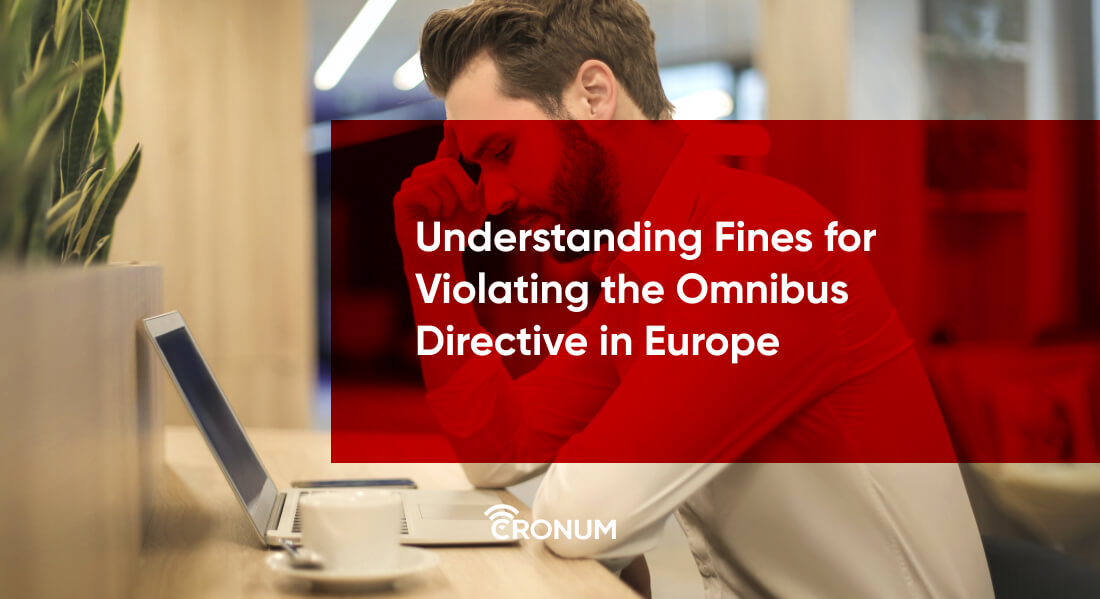The Omnibus Directive in Online- Trade: Why You Should Be Worried!
Selling online? New rule – the Omnibus Directive – might affect you. Don’t risk trouble, let’s dive in!
Online shopping’s great, right? But now there’s a new rule, the Omnibus Directive. Its goal is simple: to ensure price honesty online, especially for European shops offering discounts.
Ignoring this rule could mean big problems like warnings, lawsuits, and hefty fines. Think 4% of your annual income, or 2 million euros!
Stay tuned, as we explore the Omnibus Directive in detail, its benefits for shoppers and compliance for sellers. Don’t worry, we’ll keep it easy to understand for all!
A Simple Example:
Imagine a company called Company A. It makes 50 million euros every year and earns a profit of 10% (5 million euros). If this company does not follow the Omnibus Directive, it could face a fine. The fine would be 4% of its annual revenue, which is 2 million euros (50 million * 0.04).
This fine is a big deal because it must be paid from the company’s profit. In this example, the 2 million euro fine takes away 40% of the company’s yearly profit (2 million / 5 million). This could hurt the company’s money situation, future plans, and investments.
If a company’s revenue information is not known, the minimum fine of 2 million euros still applies. For a smaller company with less money and profit, this fine could be even more harmful. It could take away all their profit or even cause a loss.
In the end, these fines are a big deal because they are based on revenue but must be paid from profit. The examples show the possible effects on a company’s money situation and growth, highlighting the importance of following the Omnibus Directive.
Why Every Online Shop Should Care About the Omnibus Directive
Shocking fact – only about 1-3% of online shops are fully compliant. This means many customers are winning in court, costing shops money. Some even believe half of the shops might face a fine in the next year.
But fear not – we’ve seen this coming, thanks to our eCommerce customers.
We’ve already come up with a solution that we’re happy to share. And the best part? It’s really affordable. So, let’s get ready to dive in and learn more about how to play by the rules and avoid any trouble!
Online shopping can be tricky, especially with all the rules to follow. That’s where our Shopify app comes in. It’s like having a super-smart friend who knows all about the Omnibus Directive and how to follow it!
But the best part? It does everything for you! You don’t have to be a tech wizard or hire a developer to use it. Once it’s set up, it takes care of everything. It tracks your prices, makes sure you’re playing fair, and helps you avoid any nasty surprises.
Our Shopify app is super easy to use, fully automatic, and it won’t break the bank. Plus, it’s got lots of cool features that make running your online shop a breeze. So why wait? Make your online shop better, smarter, and safer with our Shopify app today!
Why the Omnibus Directive is a Win-Win
The Omnibus Directive isn’t just great for shoppers; it’s a boost for online shops too! Here’s why:
- Building Trust: More trust in online shopping means more people ready to click ‘buy.’ That’s more sales and a bigger, happier customer base!
- Growing Together: Even if a shop’s piece of the pie doesn’t get bigger, the whole pie is growing. That means more profits for everyone!
- Riding the Wind: Being in a market that’s growing is like sailing with a strong wind. It’s easier to move forward and reach new heights!
- Making Markets Safe: Rules in new markets are like guardrails. They keep everyone safe and help build trust.
So, when online shops follow the Omnibus Directive, it’s like putting on a superhero cape. They help shoppers feel safe, and they help the whole online shopping world grow. That’s a true win-win!
How Big Fines Make Online Shops Play Nice

You might wonder how the ‘money police’ (that’s what we’ll call the people who give out fines) decide how much a shop has to pay when they break the rules. It’s all about fairness!
When a shop breaks the rules, the money police look at a few things:
- How bad was the rule-breaking? Did it go on for a long time?
- What did the shop do to fix their mistake and help their customers?
- Has the shop broken rules before?
- Did the shop make extra money because they broke the rules?
- Have other shops been fined for the same thing in different countries?
- Are there other things that make the rule-breaking better or worse?
Sometimes, a shop might break rules from the Omnibus Directive and another set of rules called the Unfair Commercial Practices Directive (UCPD). That’s like breaking two sets of rules at the same time, which can lead to a BIG fine.
The money police can ask a shop to pay up to 4% of the money they made in a year. If they don’t know how much money the shop made, they can ask for at least 2 million euros. That’s a lot of money!
These big fines are there to remind shops how important it is to follow the rules. When shops play nice and treat customers fairly, everyone wins!
Up next: Some helpful tips for shops to follow the rules.
Playing by the Rules: Tips for Online Shops
Alright, online shops, listen up! Here’s how you can make sure you’re playing by the Omnibus Directive rules:
- Show the Lowest Price: If you’re saying ‘Price Drop!’, make sure to show the lowest price in the last 30 days or more. Easy peasy!
- Be Honest with Sales: If you’re giving a big sale like ‘20% off everything’, show the lowest price for each thing in the last 30 days or more. No tricks!
- Be Careful with Discounts: The rules don’t count for discounts that aren’t for special events, like adjusting prices or giving special offers to certain people.
The Truth about Sales and Discounts
Now, there’s a special rule in the Omnibus Directive called Article 6a. This rule says that shops must be totally honest about price drops. No pretending the price was higher before or lying about how much you save. This helps us, the customers, know exactly how much we’re saving.
So, Who Needs to Play by These Rules?”

The rules apply to businesses selling physical goods but not services or digital content. It is irrelevant whether they sell in stores or online, or if they are based inside or outside Europe. If they sell to customers in Europe, they must comply with these rules.
Level Up Your Business with Our Shopify App!
Imagine an assistant who works for you 24/7, making sure your online shop ticks all the boxes for Europe’s Omnibus Directive rules. Sounds cool, right? That’s what our Shopify App does!
Our app is like a smart, silent partner that always keeps your online shop in line. It’s fully automatic – once installed, it does everything for you. No need for a tech whizz to set it up. Plus, it’s super easy to use, no complicated steps involved.
We’ve developed this app alongside the highest-grossing online shop in all of Europe. If it works for them, it’ll work for you. From small businesses to big players, our app adapts to your needs.
The best part? It starts at only $5 a month – that’s less than a lunchtime snack or shipping a package! But this tiny investment can save you from fines that could take a big bite out of your profits, up to 4% of your annual turnover. That’s a lot of cash you could lose without our app on your side!
So why risk it? Equip your business with our Shopify App today. Spend less time worrying about fines and more time growing your profits. It’s a no-brainer!
Announcing Discounts: What Businesses Need to Do
When a shop puts up a ‘Sale’ sign, there are certain rules they have to follow:
- They need to tell us what the price was before the sale.
- This ‘before sale’ price must be the lowest price they had for at least 30 days before the sale.
- Rules can be a bit different for things that go bad quickly or new things that have been on sale for less than 30 days.
- If a shop has many things on sale at once, they should use the price before any discount as the old price.
But not all deals follow these rules. For example:
- If a shop lowers its prices without a ‘Sale’ sign, these rules don’t apply.
- Long-term deals or special offers for special customers don’t need to follow these rules.
- Shops can say things like “best prices” or “lowest prices” without specifying a discount.
- They can compare their prices with other shops or offer special deals if you buy more than one item.
- And lastly, those deals where the more you buy, the more you save, called “incremental discounts”, don’t need to follow these rules either.”
“Incremental discounts” motivate customers to purchase more items or make repeated purchases by gradually increasing the discount as they buy more items or over time.
Some Are Off the Hook: Who Doesn’t Need to Follow These Rules?

Websites that help businesses sell stuff or show prices from different stores don’t have to follow these rules. Also, “cash-back” promotions, where another company promises to give you back some of the money you spent, don’t need to stick to the rules either.
What’s OK and What’s Not OK with Discounts:
- Shops can have a ‘20% off everything today’ sale, but they should show the old price next to the item.
- Discounts that lots of customers can get, like with special codes or customer loyalty programs, have to follow the rules.
- But discounts where you get points for future shopping or special ‘20% off’ coupons after you buy something don’t need to follow the rules.
Additional crucial information:
Also, there’s another big rule book called the Unfair Commercial Practices Directive (UCPD). It covers things like businesses telling lies about how good their prices are. They’re allowed to compare their prices with other stores or the manufacturer’s suggested price, but the UCPD regulates this.”
In simpler terms: Everyone’s got to play fair in the playground of shopping, and there are special rule books to make sure of that!
Black Friday “Discount” Tactics Under Scrutiny
Did you know that in some cases, products were cheaper at the beginning of November than on Black Friday? Dealavo’s analysis found this to be true for 47% of toys! With the Omnibus Directive, retailers must now use the lowest price from the last 30 days for a product to calculate discounts. This will prevent customer deception and promote transparency. Both consumers and sellers can benefit from these protective measures.
Key points:
- Retailers must use the lowest price from the last 30 days for calculating discounts.
- Increased transparency and fair competition for online retailers.
Authentic Customer Reviews are Essential
As a retailer, you must ensure that product reviews on your website come from customers who have actually used or purchased the product. Fake reviews and paid testimonials are no longer allowed, so you must guarantee the authenticity of your reviews.
Key points:
- Reviews must come from genuine customers.
- Fake reviews and paid testimonials are prohibited.
New Information Obligations for Sellers
Sellers must now indicate whether they are a business or private individual on sales platforms. This is important because EU regulations do not apply to private individuals, and customers need to be aware of this fact.
Key points:
- Sellers must disclose their status as a business or private individual.
- Customers must be informed of the seller’s status before making a purchase.
The Big Finish
Is this new big rule book, the Omnibus Directive, like a cool breeze for shopping in Europe? We’ll have to wait and see, but it might make online shopping clearer and more trustworthy.
Both online shops and customers really need to pay attention to the Omnibus Directive. Shops should stick to the rules to avoid trouble and keep customers trusting them. By understanding how these rules help shoppers and working together to follow them, shops and customers can make online shopping safer and more reliable.”
In easier words: This new rule book could be a game-changer. If everyone plays fair, shopping online can be a win-win for everyone!

Presenting our fantastic Shopify app, your ultimate solution to all the tricky Omnibus Directive rules! No coding, no complications. Just a one-click install and everything happens automatically!
Our app has a friendly price of just $5 a month – that’s less than the cost of shipping a parcel or grabbing a lunchtime snack. And in return, it’s set to safeguard your business, potentially saving you up to 4% of your annual turnover.
This app is tailor-made for large inventories, designed in partnership with Europe’s top revenue-generating online shop. If it works for them, it’ll work for you. Don’t let compliance be a pain, let our app be your gain.
Invest in our app today, save money and say goodbye to Omnibus Directive woes!
Impressive Features:
- No programmer required: The app installs itself in under 5 minutes
- Exciting design choices: Customize the app’s appearance to your liking
- Tracks price changes for all items in your store
- Multiple languages: Customers can shop in their preferred language
- Exceptional speed: Works well for stores with a large number of products
Legal Advice and Accuracy of Information
Please be aware that Cronum UG does not provide legal advice or engage in the practice of law. The information and content provided on our website, blog, or any other communication channel are for informational purposes only and should not be considered as legal advice.
Cronum UG makes every effort to ensure the accuracy and reliability of the information provided. However, we cannot guarantee the accuracy, completeness, or suitability of the information for any specific purpose. As a result, Cronum UG disclaims any liability or responsibility for any errors, omissions, or inaccuracies in the information provided.
We strongly recommend consulting with a qualified legal professional before making any decisions or taking any actions based on the information provided by Cronum UG. By using our website, blog, or any other communication channel, you acknowledge and agree that you are solely responsible for your actions and decisions, and that Cronum UG shall not be held liable for any losses, damages, or consequences arising from the use of, or reliance upon, the information provided.

Get in Touch - Get started with custom eCommerce solutions for your Shopify store
Stay Up-to-Date with the Shopify Ecosystem
No charge. Unsubscribe anytime.




